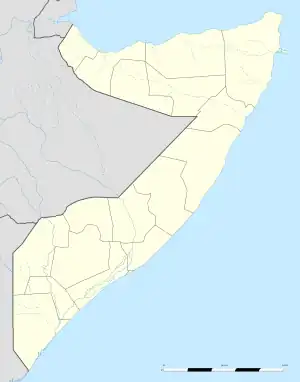Kamboni
Kamboni (Arabic: كامبوني; Somali: Kambooni) is a town in the Badhaadhe district of Lower Juba region, Somalia, which lies on a peninsula near the border with Kenya. It is the southernmost town in Somalia. The tip of that peninsula is called Ras Kamboni (Cape Kamboni). The town is located 274 kilometers south of Kismayo. The Town population is 79,000.[1] American officials have said that it has served as a training camp for extremists with connections to Al-Qaeda; al-Sharq al-Awsat reported in May 1999 that al-Qaeda was installing sophisticated communications equipment in the camp.[2][3]
Kamboni
كامبوني | |
|---|---|
 Kamboni Location in Somalia | |
| Coordinates: 1°38′S 41°35′E | |
| Country | |
| State | |
| Region | Jubbada Hoose |
| District | Badhaadhe District |
| Time zone | UTC+3 (EAT) |
US security concerns in the Horn of Africa, particularly at Kamboni, heightened after the attacks on 9/11. On December 16, 2001, Paul Wolfowitz said the US was meeting with various Somali and Ethiopian contacts to "observe, survey possible escape routes, possible sanctuaries" for Al Qaeda operatives.[4] On March 2, 2002 a briefing was held in the Pentagon discussing the possible use of Kamboni by Islamic terrorist groups, including al-Ittihaad al-Islamiya (AIAI) and Al Qaeda.[5] In December 2002, the US established the Combined Joint Task Force - Horn of Africa (CJTF-HOA) to monitor developments in the region and to train local militaries on counterterrorism.[6]
American officials believe that several terrorist attacks were orchestrated from Kamboni, including the 1998 United States embassy bombings and the 2002 Mombasa hotel bombing.[7]
Battle of Ras Kamboni
In the 2006 war in Somalia, Islamic Courts Union fighters fled Ethiopian troops to Kamboni, to make a last stand on the country's southernmost tip.[8]
On January 8, 2007, during the battle, it was reported an AC-130 gunship belonging to the United States military had attacked suspected Al-Qaeda operatives in southern Somalia. It was also reported that the aircraft carrier USS Dwight D. Eisenhower had been moved into striking distance.[9] The aircraft flew out of its base in Djibouti. Many bodies were spotted on the ground, but the identity of the dead or wounded was not yet established. The aid organization, Oxfam, reported 100 nomads were killed. The targeted leaders were tracked by the use of unmanned aerial vehicles (UAVs) as they headed south from Mogadishu starting on December 28.[10]
Further developments
Al-Shabaab took control of Kamboni after the Ethiopian withdrawal. However, on October 20, 2011, Somali Transitional Federal Government forces seized control of the town in what a military spokesman characterised as a bloodless takeover.[11]
References
- "Kamboni to Kismayo".
- "CBS: U.S. Strikes Al Qaeda In Somalia". CBS News. 2007-01-08. Archived from the original on 2008-11-06. Retrieved 2007-01-08.
- "Night Falls on Mogadishu". The Weekly Standard. 2006-07-03. Retrieved 2007-01-08.
- Reeve, Simon (2001-12-16). "U.S. returning to a nightmare called Somalia". San Francisco Chronicle. Retrieved 2007-01-08.
- Terrorist Threat in Horn of Africa US Department of State
- Combined Joint Task Force - Horn of Africa globalsecurity.org
- Abdi Abdi, " The Talibanisation of Somalia", Ethiopian News Agency, 12 July 2006
- Elizabeth A. Kennedy, "Somalia's Islamists vow to heed al-Qaida", Associated Press, 5 January 2007
- "U.S. targets al Qaeda suspects in Somalia, Pentagon official says". CNN. 2007-01-08. Archived from the original on 2007-01-10. Retrieved 2007-01-08.
- "Reports say U.S. targeted al Qaeda suspects in Somalia". 2007-01-09. Retrieved 2007-01-09.
- Leftie, Peter (20 October 2011). "Somalia: Kenyan Forces Capture Shabaab's Ras Kamboni". allAfrica.com. Retrieved 23 October 2011.